U.S. Embassy launches virtual tour project recognizing heritage of the Qhapaq Nan road
The U.S. Embassy in Quito presented on August 8 the virtual tours Traveling the Qhapaq Ñan – the Andean Road System (Recorriendo el Qhapaq Ñan – el sistema vial andino), a regional project that encourages greater protection of cultural heritage along the indigenous Andean road system by showcasing the stories of people and places and the connection between community members and their heritage.
U.S. Ambassador to Ecuador Michael J. Fitzpatrick, Ecuadorian Minister of Culture María Elena Machuca, Executive Director of the National Institute of Cultural Heritage Catalina Tello, CyArk Project Director Norma Barbacci, and other authorities attended the event.

Part of the indigenous Qhapaq Nan road system near Cuenca.
The project Traveling the Qhapaq Ñan promotes the protection of cultural heritage through place-based storytelling and was financed by the U.S. Ambassadors Fund for Cultural Preservation. The U.S.-based nongovernmental organization CyArk developed this project in 2021. CyArk, which digitally records, archives, and shares the cultural heritage of archaeological sites worldwide, used technology to document and protect the cultural legacy of three sites of relevance to the Qhapaq Ñan (Ingapirca and Pumapungo in Ecuador and the Aypate Archaeological Complex in Peru).
“It is very exciting to see how collaboration between countries and the local community can achieve projects for the benefit of their people and cultural heritage. Thanks to this virtual platform, thousands of people around the world will be able to know, learn about, and protect archaeological sites of the Qhapaq Ñan, the ancient Inca trail,” Ambassador Fitzpatrick said.
Nearly 30 local participants worked with the project and received equipment and training from U.S. experts to create 3D documentation and develop virtual experiences to explain why these sites are so important to the cultural legacy. The project also seeks to raise public awareness of the importance of heritage in order to protect it, promote tourism, and provide educational resources.
The governments of the United States and Ecuador signed an agreement in 2019 to prevent the illicit trafficking of goods. This resolution prevents imports into the United States of archaeological and ethnological material from Ecuador, from the pre-Columbian to the colonial period.
The Ambassadors Fund aims to support other countries in conserving their cultural heritage and to demonstrate the United States’ respect for other cultures, prosperity, and stability around the world. The Fund focuses on projects to conserve and restore movable and immovable cultural property such as cultural sites, cultural properties, and collections, and endangered forms of cultural and traditional expressions.
_________________
Credit: Dialog Americas





















